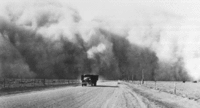-
Bill would encourage development of drugs to treat antibiotic-resistant bacteria
The U.S. Centers for Disease Control and Prevention(CDC) reported that two million Americans are infected by antibiotic-resistant pathogens every year, and the pathogens cause 23,000 deaths annually. In 1990, about twenty pharmaceutical companies had large antibiotic research and development programs, but today only three large firms and a few small companies are investing in antibiotic research. A new proposed bill, the Developing an Innovative Strategy for Antimicrobial Resistant Microorganisms Act, would encourage pharmaceutical companies to develop new drugs to treat antibiotic-resistant bacteria.
-
-
Absorbent used in kitty litter may be cause of radiation leaks in U.S. nuke dump
A wheat-based absorbent often used in kitty litter may be the likely cause of the radiation leak that led to the closure of the Waste Isolation Pilot Plant(WIPP), the U.S. only underground nuclear waste repository, according to Jim Conca, a former geochemist at Los Alamos National Laboratory(LANL). Conca noted that EnergySolutions, a Salt Lake City-based company hired to package radioactive waste at LANL into containers for shipment to the WIPP, switched from using a clay-based absorbent in the storage drums to a wheat-based mixture.
-
-
Pandemics: who should be given life-saving treatment first? Who should make the decision?
In the event of a flu pandemic, who should have priority access to life-saving ventilators, and who should make that determination? Few disaster preparedness plans have taken community values regarding allocation into account, but a new study is aiming to change that through public engagement with Maryland residents. “In the event of a healthcare crisis, understanding the community perspective and having citizen buy-in will be critical to avoid compounding the initial disaster with further social upheaval,” says the principal investigator.
-
-
Better understanding of the 1918 Flu Pandemic aids in better infectious disease response today
The 1918 Flu Pandemic infected over 500 million people, killing at least fifty million. Now, researchers have analyzed the pandemic in two remote regions of North America, finding that despite their geographical divide, both regions had environmental, nutritional, and economic factors that influenced morbidity during the pandemic. Findings from the research could help improve current health policies.
-
-
Second MERS case discovered in U.S.
The Centers for Disease Control and Prevention(CDC) has confirmed a second U.S. case of MERS, the Middle East respiratory virus which has been circulating on the Arabian Peninsula for the past few months. MERS does not transmit easily from person to person, but in the Middle East, it has infected those close to healthcare personnel taking care of victims. Roughly 539 confirmed cases have been reported to the World Health Organization (WHO); 145 have been fatal; 450 of the confirmed cases were in Saudi Arabia.
-
-
Large areas of Plains states now drier than during Dust Bowl

As a result of the drought conditions that have largely remained a constant since 2011, parts of the Texas and Oklahoma panhandles, as well as northeastern New Mexico and southeaster Colorado, are now drier than they were during the infamous Dust Bowl of the 1930s. While experts explain that the possibility of another Dust Bowl is not likely due to modern farming and irrigation techniques which have been enacted as a response in the 1930s, greater erosion due to drought and wind has resulted in a number of vicious dust storms.
-
-
Validating air sampling techniques to fight bioterrorism
Air and surface sampling techniques currently used by the U.S. government are effective in fighting bioterrorism and potentially saving lives, a new study says. Air sampling has been readily accepted for similar uses such as measuring for particulate matter, but using it to detect bacteria in biological terrorism was a new concept instituted after the 9/11 attacks. This type of sampling is now part of a sophisticated system used by the DHS and the Department of Defense. In order for the system to work more efficiently, however, experts say that the detection cycle, which currently takes between 12-36 hours, would need to produce results in a shorter time frame.
-
-
Battelle shows smart technology for biodefense and hazard avoidance
Battelle last week announced production of the next generation chemical and biological hazard sensor system, which the company says operates at a fraction of the cost of current technologies. The technology, known as the Resource Effective BioIdentification System (REBS), is a battery-powered system capable of autonomous use with operating costs of less than $1 per day per unit (the company notes that current system costs that can range from $500 - $3,000 per day) and assay costs of $0.04 per sample (compared to current systems at over $100 per sample).
-
-
New biodefense centers offer modernized approach, face criticism
A new facility at Texas A&M University is one of three new biodefense centers created by the U.S. Department of Health and Human Services (HHS) to revolutionize the way fatal viruses are countered in the event of an emergency. The $286-million lab features mobile clean rooms that can be detached and moved to form different production or testing systems as the need arises. Not everyone agrees that the design and capabilities of the new center would offer the best response to biothreats.
-
-
Farmers try to cope with the challenges posed by extreme weather
Across the country, farmers are reporting that they are at yet another critical juncture for agriculture. Citing more unpredictable and severe weather due to climate change, scientists are researching defensive measures and looking to previous agricultural challenges for inspiration. Some are looking to the way individual farmers and government agencies addressed the Dust Bowl hardships of America during the Great Depression as a source of inspiration.
-
-
Debate intensifies over whether or not to destroy last stockpile of smallpox

The world’s health ministers are scheduled to meet later this month to discuss the fate of the last known stockpiles of smallpox, held under tight security in two labs— one in the United States and the other in Russia. Smallpox has been eradicated for more than three decades, but some U.S. health officials say the remaining stockpiles should be kept for further studies. The smallpox virus is being used to develop drugs and safer vaccines in case the virus returns through terrorism or a lab accident. Member nations of the World Health Organization (WHO) once agreed that the last virus strains known to officials would eventually be destroyed, but a set date was never agreed upon.
-
-
California bill banning use of antibiotics in livestock withdrawn

The Centers for Disease Control and Preventionreports that 23,000 people die every year from infections that cannot be cured, often due to overuse of antibiotics which creates drug resistant bugs. Last Wednesday, California Assemblyman Kevin Mullin (D-San Mateo) withdrew proposed legislation which would ban the sale of meat and poultry fed on nontherapeutic antibiotics. He lacked sufficient support from fellow legislators.
-
-
New technology to detect previously undetectable fecal contamination in water
Technology capable of sampling water systems to find indicators of fecal matter contamination that are thousandths and even millionths of times smaller than those found by conventional methods is being developed by researchers. The researchers have developed an ultrasensitive detection method that can detect molecules associated with human and animal fecal matter in water systems. These extremely small indicators, he explains, have been traditionally difficult to detect but can signal greater levels of contamination, which can lead to illness and even death.
-
-
U.S. corn yields increasingly vulnerable to hot, dry weather
The United States produces 40 percent of the world’s corn, mostly in Iowa, Illinois, and Indiana. As more than 80 percent of U.S. agricultural land relies on natural rainfall rather than irrigation, corn farmers in these regions depend on precipitation, air temperature, and humidity for optimal plant growth. U.S. corn yields are growing more sensitive to heat and drought. Farmers are faced with difficult tradeoffs in adapting to a changing climate in which unfavorable weather will become more common.
-
-
Promising agents breach superbug defenses to fight antibiotic resistance
In the fight against “superbugs,” scientists have discovered a class of agents that can make some of the most notorious strains vulnerable to the same antibiotics that they once handily shrugged off. Scientists have been developing new agents to combat these enzymes, but the agents so far have fallen short. A new class of agents, called metallopolymers, shows promise.
-
More headlines
The long view
We Ran the C.D.C.: Kennedy Is Endangering Every American’s Health
Nine former leaders of the Centers for Disease Control and Prevention (CDC), who served as directors or acting directors under Republican and Democratic administrations, serving under presidents from Jimmy Carter to Donald Trrump, argue that HHS Secretary Roert F. Kennedy Jr. poses a clear and present danger to the health of Americans. He has placed anti-vaxxers and conspiracy theorists at top HHS positions, and he appears to be guided by a hostility to science and a belief in bizarre, unscientific approaches to public health.
